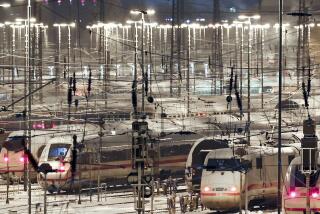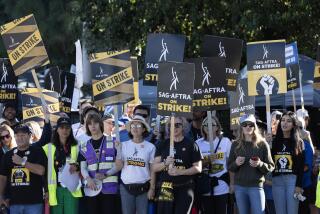German Factory Strike Appears Imminent After Talks Break Down
- Share via
BONN — Germany appeared Sunday to be heading toward its worst labor unrest in a decade after the breakdown of last-ditch talks to avert a strike in the manufacturing sector.
The leadership of the 3.6-million-strong IG Metall engineering union will start receiving notification from regional branches this week that talks with employers have failed.
IG Metall has already announced its intention to call a strike ballot Feb. 21.
“The result of this ballot is already certain,” commented the weekly Welt am Sonntag: “Strike.”
IG Metall President Klaus Zwickel told German radio he was “no longer at all optimistic” there would be a fresh attempt to reach agreement, even though Germany is suffering from high unemployment and its worst postwar recession.
Dieter Kirchner, managing director of the employers’ federation Gesamtmetall, told Welt am Sonntag: “I can’t imagine us inviting this dogmatic and unrealistic union to seek a solution with us again.”
The first all-out stoppage in Germany’s most important industrial sector since 1984 looked increasingly inevitable even before the failed top-level crisis talks between union leaders and employers Friday.
Neither side reported any narrowing of the gap between employers’ demands for pay cuts and more flexible working hours and the union’s call for more pay, or at least job guarantees, and the retention of a 37-hour week it fought for years to get.
Commentators agreed that a strike could not come at a worse time, as industry struggles to emerge from recession and to adjust to stiff competition from countries with lower costs and less rigid working practices.
“It would be one of the greatest political idiocies of recent years, but union and employers seem determined to commit it,” wrote the mass-circulation Bild am Sonntag.
Both parties came in for equal criticism--employers for trying to backpedal on pay concessions made in earlier years, and the union for being dogmatic in demands over working hours and refusing to allow flexible solutions for different firms.
The Frankfurter Allgemeine Sonntagszeitung said a strike would have even more dramatic consequences than the 1984 stoppage--which cut half a percentage point off Germany’s economic growth, measured by gross national product.
It said the union should stop complaining that the employers were trying to turn back the clock to before 1984.
“What would be so bad if the German economy looked like it did in 1984, before the expensive reductions in working hours on full pay, when there was 3.1% growth and 2.4% inflation?” the paper said.
The Germany economy is expected to grow only about 1% this year after a 1.3% slump in 1993, and inflation is running at an annual 3.5%.
More to Read
Inside the business of entertainment
The Wide Shot brings you news, analysis and insights on everything from streaming wars to production — and what it all means for the future.
You may occasionally receive promotional content from the Los Angeles Times.









